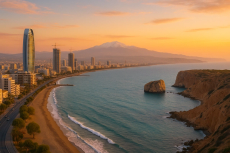Blog • Published on:March 28, 2025 | Updated on:March 28, 2025 • 14 Min
Why Are Some Countries Pushing Away Wealth? And Where Can Wealthy Migrants Go?
The movement of wealth across borders is undergoing a dramatic transformation. Countries that once eagerly welcomed affluent investors are now shutting down or tightening their residency and citizenship programs, citing economic and social concerns.
Meanwhile, other nations are capitalizing on this shift, offering attractive new pathways for high-net-worth individuals (HNWIs) looking for stability, tax advantages, and global mobility.
So, what’s behind this change? Why are some governments pushing wealth away while others are strategically positioning themselves as magnets for the ultra-rich? And most importantly, where can those seeking new opportunities go next?
The answers lie in shifting political landscapes, economic pressures, and the evolving priorities of global elites.
Top 20 Countries for HNWI Migration in 2025
Global Trends Reshaping Wealth Migration
Several countries that once welcomed affluent investors through residency and citizenship programs are now pulling back or tightening their policies. The reasons range from national security concerns to rising housing prices and shifting political priorities.
While some nations argue these changes are necessary to protect their economies and local populations, others are seizing the opportunity to attract wealthy migrants looking for alternatives.
Australia: Shutting Down the Significant Investor Visa (SIV)
For years, Australia has been a hotspot for wealthy migrants seeking stability and economic opportunity. However, the government plans to scrap the Significant Investor Visa (SIV), which allowed individuals to obtain residency by investing AUD 5 million in Australian assets.
- Officials argue the program has not driven economic growth as intended, with many investors favoring low-risk assets like government bonds rather than creating jobs or funding innovation.
- Australia is now exploring alternative pathways, including a National Innovation Visa (NIV), which would prioritize entrepreneurs and high-skilled talent over passive investors.
Netherlands: Clamping Down on Foreign Investment in Key Sectors
The Netherlands has moved to restrict foreign investments, particularly from non-EU countries, in industries deemed vital to national security.
- Key concerns: The government is limiting capital inflows in sectors like telecommunications, energy, and defense, citing the need to protect critical infrastructure from foreign influence.
- Housing impact: Like many European nations, the Netherlands has seen rising real estate prices due to foreign investment, prompting calls for tighter residency requirements to ease pressure on local housing markets.
France: Raising the Bar for Foreign Investors
France has been tightening its investment migration policies, particularly in real estate and business investment programs.
- Higher investment thresholds: The French Talent Passport program, previously accessible with an investment of €300,000, is under review, with potential higher financial requirements to prevent misuse.
- Real estate restrictions: In response to soaring property prices in Paris, France is limiting foreign real estate purchases, particularly for non-EU buyers.
- Political influence: Populist movements have increased scrutiny on investment migration, with critics arguing that it benefits only a select few while contributing to wealth inequality.
United States: The Shift from Investment Migration to Tax and Political Changes
While the EB-5 Investor Visa Program remains a pathway for foreign investors, the bigger concerns for wealthy migrants in the U.S. are rising taxes and political uncertainty rather than visa access itself.
- Tax policy shifts: Proposals to increase capital gains taxes and tighten wealth tax regulations have led some affluent individuals to explore relocation.
- State-level restrictions: Some states, like Florida and Texas, are cracking down on foreign real estate purchases, particularly from Chinese and Russian investors, citing national security concerns.
- Immigration backlog: While the EB-5 visa remains available, processing delays and stricter financial scrutiny have made it a slower and more complex process than before.
Top Destinations for High-Net-Worth Immigrants in 2025
As traditional investment migration destinations tighten their policies, high-net-worth individuals (HNWIs) are exploring alternative countries that offer favorable conditions for relocation. Here are some of the top destinations attracting wealthy immigrants in 2025:
United Arab Emirates (UAE): The Rising Global Wealth Magnet
Today, a significant percentage of the world’s private wealth is concentrated in the UAE, a country that continues to attract high-net-worth individuals (HNWIs) with open arms.
With zero income tax, a robust financial ecosystem, and a prime geographic position, the UAE has cemented itself as a top destination for wealth migration.
As the landscape of global wealth shifts, the UAE is leading the pack. Only recently, following a major exodus of millionaires from the UK, investors have turned to Dubai and Abu Dhabi for financial security, economic opportunities, and a superior lifestyle.
The surge in HNWIs moving to the UAE is driven by political and tax stability, a booming real estate market, and an expanding network of world-class banking services.
Golden Visa Program: The UAE Golden Visa offers long-term residency (up to 10 years) for investors, entrepreneurs, and highly skilled professionals.
- Real Estate Investment Option: Requires a minimum property investment of AED 2 million ($545,000) in Dubai or Abu Dhabi.
- Business Investment Option: Investors in UAE-based startups or existing businesses may qualify for the Golden Visa under the investment category.
Caribbean Nations: Quick Citizenship and Global Mobility
- Investment Requirement: Minimum non-refundable contribution of $235,000 to the National Transformation Fund, or $270,000 in Real Estate.
- Processing Time: Approximately 6-8 Months.
- Visa-Free Access: Holders of a Grenadian passport enjoy visa-free or visa-on-arrival access to over 140 +countries including the UK, Schengen Area, China, and Russia.
- Investment Requirement: Minimum investment of $230,000 to the National Development Fund or $300,000 Donation in real estate.
- Processing Time: Approximately 4–6 months.
- Visa-Free Access: Citizens gain visa-free or visa-on-arrival access to over 150 countries, including the UK and Schengen Area.
- Investment Requirement: Minimum non-refundable contribution of $250,000 or a real estate investment starting at $350,000.
- Processing Time: Approximately 6–8 months.
- Visa-Free Access: Citizens enjoy visa-free or visa-on-arrival access to over 150 countries, including the UK, Schengen Area, and Singapore.
- Investment Requirement: Minimum non-refundable contribution of $200,000 to the Economic Diversification Fund or a real estate investment starting at $200,000.
- Processing Time: Approximately 6–8 months.
- Visa-Free Access: Dominica passport holders have visa-free or visa-on-arrival access to over 140 countries, including the UK and Schengen Area.
European Countries: Residency Leading to Citizenship
- Investment Requirement: Minimum investment of €500,000in an investment fund.
- Residency Requirement: Maintain the investment for 5 years with an average stay of 7 days per year.
- Path to Citizenship: Eligible for citizenship after 5 years of residency.
- Visa-Free Access: Portuguese residency holders enjoy visa-free or visa-on-arrival access to 29 Schengen countries
- Investment Requirement: A mixed investment totaling€680,000, including a donation, real estate purchase, and other contributions.
- Residency Requirement: Maintain residency for 12–36 months before applying for citizenship.
- Visa-Free Access: Maltese citizens have visa-free or visa-on-arrival access to over 160 countries.
- Investment Requirement: Minimum real estate investment of €250,000.
- Residency Requirement: No minimum stay requirement.
- Path to Citizenship: Eligible for citizenship after 7 years of residency.
- Visa-Free Access: Greek residency holders enjoy visa-free or visa-on-arrival access to 29 countries.
- Investment Requirement: Minimum real estate investment of $400,000.
- Processing Time: Citizenship granted within 6–8 months.
- Visa-Free Access: Turkish citizens have visa-free or visa-on-arrival access to over 120 countries, including Japan and South Korea.
These programs offer HNWIs diverse options to secure residency or citizenship in countries that provide strategic advantages, lifestyle benefits, and global mobility.
The Recent Changes in Global Golden Visa Programs
In recent years, Golden Visa programs worldwide have undergone significant transformations. Governments are reevaluating their policies, introducing stricter investment requirements, and in some cases, shutting down residency-by-investment schemes altogether.
These shifts come as policymakers balance foreign investment with economic stability and public sentiment, making it crucial for investors to stay updated on the latest developments.
Golden Visa programs have always been subject to policy changes, but recent trends indicate a stronger push toward regulation, transparency, and a shift away from real estate-based investment pathways.
With new restrictions emerging and alternative programs gaining traction, what happened in recent years, and where do things stand now?
Housing Crises and Policy Shifts in Major Markets
One of the biggest criticisms of Golden Visa programs has been their impact on real estate prices. In many cities, an influx of foreign capital into property markets has contributed to housing shortages and affordability issues.
The backlash has led governments to restructure or discontinue real estate-based Golden Visa options, especially in high-demand regions.
Portugal: Real Estate No Longer Qualifies for Golden Visa
Portugal’s Golden Visa program was once one of the most popular in Europe, largely due to its real estate investment pathway. However, this led to soaring property prices in Lisbon and Porto, sparking protests and calls for reform.
- Policy Change: As of 2023, Portugal eliminated real estate investment as a qualifying option. Investors must now choose business, cultural, or scientific investments to secure residency.
Spain: Considering a Full Phase-Out of the Golden Visa
Spain has officially cancelled its Golden Visa program due to housing affordability concerns.
- Key Cities Affected: Madrid, Barcelona, and the Balearic Islands have seen real estate price surges linked to Golden Visa investments.
Greece: Investment Requirement Changes in Key Areas
Greece continues to run one of Europe’s most accessible Golden Visa programs, but recent changes have increased the investment threshold in high-demand locations.
- New Investment Requirement: The minimum real estate investment increased to €800,000 in areas such as Athens, Thessaloniki, Mykonos, and Santorini to slow property speculation.
Public Opinion: The Growing Pushback Against Wealth-Based Immigration
Golden Visa programs were initially designed as mutually beneficial arrangements, bringing in foreign capital while offering investors residency in stable economies. However, in recent years, public sentiment has turned increasingly negative.
Concerns Driving the Backlash
- Perception of Inequality: Many citizens resent the idea that wealthy individuals can "buy" residency, while other immigrants face long and complex immigration processes.
- Lack of Economic Contribution: Critics argue that many investors choose passive real estate investments instead of direct business investments that create jobs.
- EU Push for Reform: The European Commission has pressured countries to phase out Golden Visa programs, citing risks related to money laundering, corruption, and security threats.
How Governments Are Changing Golden Visa Programs for Sustainable Investment
As global investment migration evolves, several countries are refining their Golden Visa programs to create more balanced, long-term economic benefits.
Instead of focusing purely on real estate, these nations are introducing new investment pathways, enhancing program integrity, and directing foreign capital into areas that drive economic growth.
Portugal: Expanding Investment Avenues Beyond Real Estate
Portugal has transitioned away from real estate-based Golden Visas, shifting focus toward business development, research, and cultural investments. Investors can now obtain residency through:
- Funding Portuguese businesses that generate employment.
- Contributing to scientific research, technology, or sustainability projects.
- Investing in cultural and artistic initiatives that support the country’s heritage.
This shift aligns foreign investment with national development priorities, ensuring capital actively contributes to Portugal’s economy while still providing residency benefits to investors.
Malta: Strengthening Program Value with Selective Investments
Malta remains a top destination for investment migration, with its programs designed to prioritize high-value contributions to the economy. The country continues to offer both residency and citizenship options, emphasizing:
- Investment in sectors that drive economic innovation and long-term growth.
- A streamlined application process while maintaining international compliance standards.
- Diverse investment choices, including government bonds, business ventures, and philanthropic contributions.
These refinements ensure that Malta’s residency and citizenship programs remain competitive, offering strong global mobility while directing investments into key economic sectors.
Greece: Expanding Investment Opportunities Across Regions
Greece’s investment residency program continues to attract international investors, offering a wider range of opportunities beyond real estate.
- Investors now have access to new regional investment options, allowing for capital infusion into business, infrastructure, and tourism-related projects.
- The real estate investment threshold has been optimized, ensuring sustainable growth in high-demand areas while keeping attractive entry points available in emerging regions.
- The program maintains fast-track residency approval process, making it one of the most efficient pathways to EU residency.
By broadening investment choices, Greece ensures foreign capital supports economic diversification, creating growth in multiple industries while maintaining an attractive residency-by-investment program.
New Trends in Investment Migration
As real estate-based investment visas decline, alternative residency and citizenship pathways are gaining traction.
Countries are adjusting their policies to prioritize business growth, innovation, and long-term economic benefits, rather than passive capital inflows into housing markets.
Entrepreneur and Innovation Visas
Many governments are replacing passive investor visas with programs targeting entrepreneurs and business leaders. These visas typically require:
- Establishing or investing in a local business that creates jobs.
- Contributing to tech startups, research, and high-growth industries.
- Meeting performance benchmarks, such as revenue targets or employment quotas, to qualify for permanent residency.
Examples of Entrepreneur/Innovation Visa Programs:
- UK Innovator Visa: Requires entrepreneurs to launch a scalable, innovative business in the UK.
- Canada Start-Up Visa: Designed for foreign entrepreneurs who secure investment from designated venture capital firms.
- Australia Business Innovation Visa: Requires establishing or investing in a commercial enterprise with long-term growth potential.
These programs shift the focus from simply injecting capital into an economy to actively contributing to business development and employment generation.
Donation-Based Citizenship Programs
Several Caribbean nations continue to offer citizenship in exchange for contributions to government-backed development funds. These programs provide fast-track nationality acquisition, without the need for business or real estate investment.
- Antigua and Barbuda: A $230,000 donation to the National Development Fund secures citizenship within a few months.
- St. Kitts and Nevis: Recently increased its minimum donation to $250,000, ensuring that the funds directly contribute to national infrastructure and economic projects.
- Dominica: A $200,000 government contributionremains one of the most cost-effective options for fast-track citizenship.
Unlike Golden Visas, these programs grant immediate citizenship, offering long-term security and visa-free travel to hundreds of countries.
Longer Pathways to Citizenship with Residency Options
While direct citizenship programs exist, some nations are extending residency timelines for investors before granting full nationality.
- Greece still allows investors to obtain residency through capital investment, but the path to citizenship now requires longer residency periods and stronger local ties.
- Italy and France have modified their investor residency programs, prioritizing those who contribute to job creation and economic innovation.
This trend indicates that immediate Golden Visa benefits are becoming less common, while governments encourage deeper economic engagement before granting citizenship rights.
Where Is Global Wealth Flowing? Strategic Planning for High-Net-Worth Individuals
The landscape of global wealth migration is rapidly evolving, requiring a more strategic approach from high-net-worth individuals (HNWIs) looking for the best destinations to preserve capital, enhance mobility, and secure long-term residency or citizenship.
With many traditional programs undergoing major changes, wealthy individuals are redirecting their investments toward countries that actively welcome foreign capital and offer strong economic incentives.
The primary reason for relocating—Is it tax efficiency, business expansion, global mobility, or securing a second passport for long-term security?
Investment types that align with new policies—Real estate is no longer the main pathway in most major programs, so business investment, innovation, and government fund contributions are now more relevant.
Jurisdictional stability and long-term benefits—Nations offering low-tax policies, strong financial infrastructure, and flexible business laws will continue to attract HNWIs.
As investment migration programs continue to evolve and tighten regulations, the key to successful wealth migration is preparation, timing, and selecting the right jurisdiction based on individual financial and lifestyle goals.
For expert guidance on navigating the latest investment migration opportunities, contact Savory & Partners for tailored solutions on securing residency or citizenship through strategic investments.
FAQs on Global Wealth Migration Trends and Investment Programs
What factors are leading countries to tighten or end their Golden Visa programs?
Several countries are reevaluating their Golden Visa programs due to concerns about national security, housing market inflation, and the effectiveness of these programs in promoting economic growth. For instance, Spain has moved toward ending its Golden Visa program, citing issues like rising real estate prices and limited economic benefits.
Which countries have recently made significant changes to their investment migration policies?
Several countries have recently reformed their investment migration policies:
- Portugal: Eliminated real estate investments as a qualifying option for its Golden Visa program, now focusing on business and cultural investments.
- Greece: Increased the minimum real estate investment threshold in certain areas to address property speculation.
- Spain: Is cancelled theGolden Visa program due to housing affordability concerns.
What alternative pathways are countries offering to attract high-net-worth individuals (HNWIs)?
In response to criticisms of traditional Golden Visa programs, some countries are introducing alternative pathways:
- Entrepreneur and Innovation Visas: Targeting entrepreneurs and business leaders who can establish or invest in local businesses, thereby creating jobs and contributing to economic growth.
- Donation-Based Citizenship Programs: Countries like Antigua and Barbuda offer citizenship in exchange for contributions to government-backed development funds.
How are changes in Golden Visa programs affecting global wealth migration patterns?
As traditional investment migration destinations tighten their policies, HNWIs are exploring alternative countries that offer favorable conditions for relocation. For example, countries like Malta and Greece have refined their programs to attract affluent individuals by offering diverse investment options and favorable tax regimes.
What impact does the migration of wealthy individuals have on their home countries?
The departure of HNWIs can lead to a reduction in tax revenues and potential economic challenges for their home countries. For instance, the UK has experienced an exodus of millionaires, which could have implications for its economy.
References
Knight Frank. (2025). Global wealth trends: Knight Frank's 2025 Wealth Report. Retrieved from https://www.knightfrank.com/research/article/2025-03-05-global-wealth-trends-knight-franks-2025-wealth-reportKnight Frank
The Times. (2024). Where are the UK's wealthy homebuyers moving to?. Retrieved from https://www.thetimes.co.uk/article/are-the-uks-wealthy-on-the-move-3ngl8sbmhLatest news & breaking headlines
Financial Times. (2024). Do the very wealthy relocate because of tax rises alone?. Retrieved from https://www.ft.com/content/42327e45-5867-46b6-9ef2-22d6efe73349Financial Times
Business Standard. (2025). Wealth migration: Why 142,000 millionaires are likely to relocate in 2025. Retrieved from https://www.business-standard.com/finance/personal-finance/wealth-migration-why-142-000-millionaires-are-likely-to-relocate-in-2025-125010900178_1.htmlBusiness News India
Written By

Laura Weber
Laura Weber is a legal expert in international tax planning and citizenship by investment. With over a decade of experience, Laura helps individuals and families navigate complex legal frameworks to secure dual citizenship and global residency options, particularly in the Caribbean and Europe.
Related Articles









Recently Published









Book a free consultation


